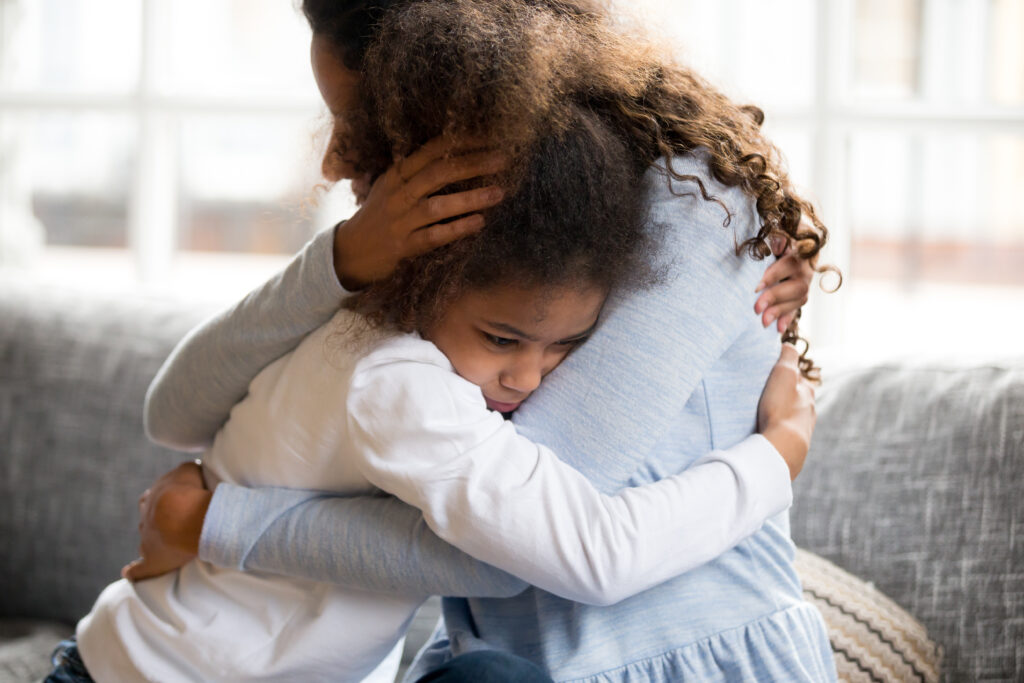
Navigating Grief with Our Children—
As parents, we often look forward to and even prepare for all the “firsts” in our children’s lives. Whether it’s first steps, first “big kid” bed, first day at school, or first job, we know those days will come. We anticipate them. We even prepare them for these “firsts,” coaching them through what to expect in kindergarten or from their boss at the local fast-food joint.
But there are some “firsts” we’d rather not think about until it happens. Like the first time our child gets a cavity or breaks an arm. Or worse, like when they first experience grief and loss. We know it’s inevitable. We know we live in a fallen world where all life is cursed by death. We see its cycle in the plant and animal world. We hear about it on the news when people die in tragic accidents or storms. But when death comes near, when a loved one dies, it’s a crushing blow that feels as though it came out of nowhere. Our heart breaks. And then we have to explain it to our children.
It’s a “first” we wish we could bypass altogether.
How can we disciple our children through grief and loss?
Revisit the Bible’s Story
The story of Creation and the Fall are ones our children learn in Sunday School and during family devotions. They are familiar stories filled with animals and names they know all too well: Adam and Eve. They are also important stories to revisit when we talk about death with our children. We remind them about how God created the world in perfection. Everything worked as it was created to. Nothing broke. No one got sick. No one got hurt. No one died. This story is why we know it isn’t right when someone dies. Because that’s not how God created things to be.
But then Genesis 3 happened. We remind our children about the story of the Fall when Satan tempted Eve, our first parents ate the forbidden fruit, and sin entered the world. And with sin came death. It’s a reality all creation faces—from insects to fish, from birds to bears, from flowers to trees, from pets to humans. Even more, we are all born spiritually dead. We don’t love God with all our heart. And that’s why Jesus came.
We then remind our children about Jesus, who came to do what Adam and Eve could not do—what we cannot do—obey God in all things. He then took the punishment we deserved and died in our place on the cross. When we trust in Him for our salvation, we are given new hearts, ones that can love God as He made us to do. And one day, Jesus will return and make all things new. One day, death will be no more, and we will live forever with Him.
The story of Creation, Fall, Redemption, and Restoration is the Bible’s story and it’s one that speaks truth to our hearts when we experience a death. Our children need a theology of death and the Bible’s story helps them understand why the world is the way that it is and what God has done about it.
Grief is a Biblical Response to Death
As we talk with our children about death, we also talk to them about grief for it is a biblical response to death. We can point out to them that Jesus grieved when His dear friend Lazarus died; He wept at his tomb. Teach your children that it’s okay to cry when someone dies because death is a terrible thing. Grief acknowledges that the world is broken, life is valuable, and things are not as they should be.
If you’ve experienced the death of a loved one before, you likely know that people grieve differently. Some might be in a state of shock for a while and feel numb and unable to cry. Some may cry until they are exhausted. Some might feel angry. We respond to grief in our own unique way and on our own timetable. When our children experience the death of a loved, they will likely look to us to see how we respond. They will take their cues from what we do and say. So be honest with your children and tell them how you are feeling. Say things like, “I’m sad that Grandma died because I loved her so much and I miss her.” Or “My heart hurts because our neighbor was a good friend.” Our children may or may not have a similar response to grief and that’s okay. There is no “supposed to” when it comes to grieving the loss of a loved one.
Point them to Jesus
The Bible not only tells us why death exists. It not only tells us that grief is normal and proper. It also shows us that we have hope even in our grief (1 Thess. 4:13). That hope is a person. Jesus is a very present help and hope for us. He hears our sorrows. He understands our griefs. Teach your children to pray about their feelings—to tell Him that they are hurt and sad about their loved one who died. Teach them to ask Him to be their help and to comfort them in their sadness. Model such prayers for them.
Above all, remind them that because Jesus rose again, He was victorious over the grave. He has conquered sin and death. He made a way for us to live forever with Him. We will one day experience what Adam and Even knew before the Fall: true happiness in the presence of our Creator.
Unlike all the other “firsts” our children experience in life, navigating the death of a loved one is not one we anticipate or prepare for. But it’s a reality we all face as parents. May the Lord be our comfort and hope as we walk our children through the realities of death and loss.

Christina Fox is a counselor, retreat speaker, and author of multiple books including The Great Big Sad: Finding Comfort in Grief and Loss. Christina attends East Cobb Presbyterian in Marietta, GA with her family.
